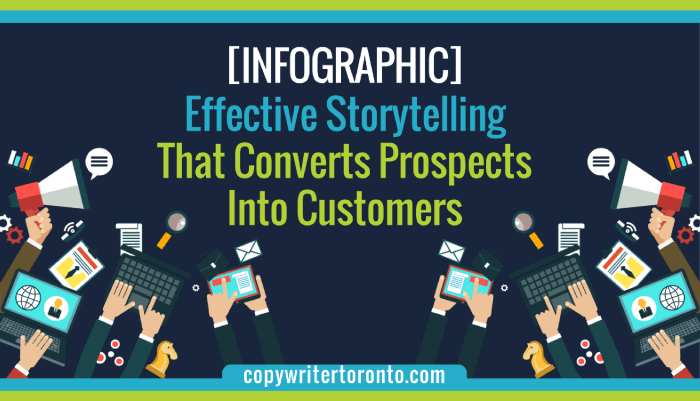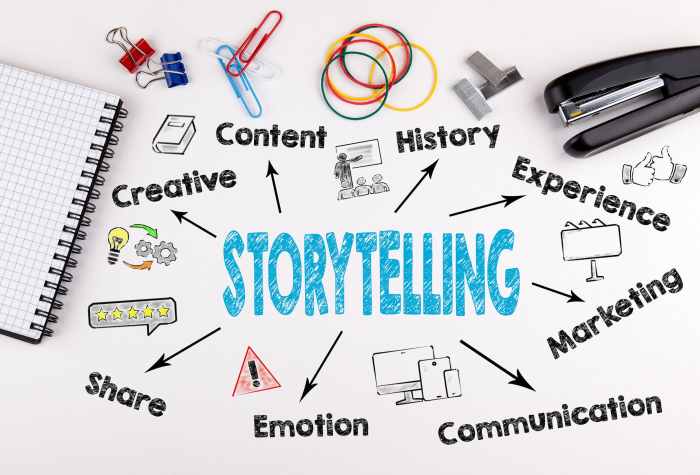Effective Storytelling in Marketing sets the stage for captivating narratives that resonate with audiences, sparking emotional connections and boosting brand recognition. Dive into the world of storytelling that drives successful marketing campaigns.
Explore the key elements, strategies, and case studies that showcase the power of storytelling in shaping consumer experiences and brand loyalty.
The Importance of Effective Storytelling in Marketing
Effective storytelling is crucial in marketing strategies as it helps brands connect with their audience on a deeper level. By weaving narratives into their campaigns, companies can capture the attention of consumers, evoke emotions, and create lasting impressions. Storytelling allows brands to stand out in a crowded market, differentiate themselves from competitors, and build a loyal customer base.
Examples of Successful Marketing Campaigns Driven by Storytelling
- Apple’s “Shot on iPhone” campaign, which featured user-generated content showcasing the quality of iPhone cameras, resonated with consumers and highlighted the power of creativity.
- Dove’s “Real Beauty” campaign challenged traditional beauty standards and promoted self-acceptance, leading to increased brand loyalty and positive brand perception.
Creating Emotional Connections with the Audience
Effective storytelling has the ability to evoke emotions such as joy, empathy, nostalgia, and inspiration. By tapping into these emotions, brands can form deeper connections with their audience, making them more relatable and memorable. Emotional storytelling can lead to increased engagement, brand affinity, and customer loyalty.
Enhancing Brand Recall and Recognition
Storytelling helps brands create a distinct identity and personality that sets them apart in the minds of consumers. Through consistent storytelling across various touchpoints, brands can reinforce their messaging, strengthen brand recall, and increase recognition. Memorable stories are more likely to be shared, talked about, and remembered by consumers, leading to long-term brand success.
Elements of Effective Storytelling in Marketing
Effective storytelling in marketing involves several key elements that work together to engage and captivate the audience. These elements include characters, plot, conflict, authenticity, relatability, clear message, call-to-action, and the use of visuals and multimedia to enhance the overall storytelling experience.
Characters, Plot, and Conflict, Effective Storytelling in Marketing
Characters play a crucial role in storytelling as they help to create a connection with the audience. A well-developed plot and conflict add depth and intrigue to the story, keeping the audience interested and invested in the narrative.
Yo, listen up! If you’re tryna boost your e-commerce game, you gotta check out these E-commerce Growth Tips. From killer marketing strategies to optimizing your website, this guide has all the deets you need to level up your online biz. Don’t sleep on it, fam!
Authenticity and Relatability
Authenticity is key in storytelling as it helps to build trust with the audience. Relatability ensures that the audience can see themselves in the story, making it more engaging and memorable.
Yo, check it out, if you’re looking to boost your e-commerce game, you gotta peep these E-commerce Growth Tips. It’s all about leveling up your online biz and making that cash flow, ya know what I’m sayin’? These tips will help you stay ahead of the game and crush it in the digital marketplace. Don’t sleep on this, fam!
Clear Message and Call-to-Action
A clear message is essential in marketing storytelling to ensure that the audience understands the purpose of the story. A strong call-to-action prompts the audience to take the desired next step, whether it’s making a purchase or signing up for a newsletter.
Visuals and Multimedia
Visuals and multimedia elements such as videos, images, and interactive content can enhance storytelling by creating a more immersive experience for the audience. These elements help to bring the story to life and make it more engaging and memorable.
Strategies for Implementing Effective Storytelling

Effective storytelling in marketing requires careful planning and execution. Here are some key strategies to consider:
Identifying Target Audience Preferences and Interests
Understanding your target audience is crucial for crafting a compelling narrative that resonates with consumers. Techniques for identifying preferences and interests include:
- Conducting market research to gather insights on consumer behavior.
- Creating buyer personas to represent different segments of your target audience.
- Engaging with customers through surveys, focus groups, and social media interactions.
- Analyzing data from website analytics, email campaigns, and other touchpoints.
Aligning Storytelling with Brand Values and Mission
It’s essential to ensure that your storytelling aligns with your brand’s values and mission to maintain authenticity. Tips for alignment include:
- Defining your brand’s core values and messaging pillars.
- Showcasing how your products or services fulfill your brand’s mission.
- Infusing storytelling with elements that reflect your brand’s personality and voice.
- Avoiding narratives that contradict or undermine your brand’s established identity.
Crafting a Compelling Narrative
Crafting a narrative that captivates and engages your audience is key to successful storytelling in marketing. Tips for crafting a compelling narrative include:
- Starting with a strong hook to grab attention from the outset.
- Developing relatable characters or scenarios that resonate with consumers.
- Building tension and conflict to keep the audience invested in the story.
- Concluding with a clear call-to-action that prompts desired consumer behavior.
Measuring Success of Storytelling in Marketing Campaigns
Measuring the success of your storytelling efforts is essential for optimizing future campaigns. Methods for measuring success include:
- Tracking key performance indicators (KPIs) such as engagement rates, conversion rates, and brand sentiment.
- Using A/B testing to compare the effectiveness of different storytelling approaches.
- Collecting feedback from customers through surveys and reviews to gauge impact.
- Utilizing tools like Google Analytics and social media insights to analyze storytelling performance.
Case Studies on Effective Storytelling in Marketing

Storytelling in marketing has proven to be a powerful tool for brands to connect with their audience on a deeper level. Let’s dive into some case studies that showcase the impact of effective storytelling in marketing campaigns.
Nike – “Dream Crazy” Campaign
- Nike’s “Dream Crazy” campaign featuring Colin Kaepernick is a prime example of effective storytelling in marketing. By aligning the brand with a powerful message of perseverance and social justice, Nike sparked conversations and resonated with consumers on a personal level.
- The campaign utilized a mix of emotional storytelling, powerful visuals, and a strong message to create a lasting impact. Nike’s bold approach paid off, leading to increased brand engagement and loyalty among consumers who connected with the brand’s values.
- The use of a controversial figure like Kaepernick also generated buzz and media attention, further amplifying the reach of the campaign and solidifying Nike’s position as a socially conscious brand.
Coca-Cola vs. Pepsi – A Tale of Two Storytelling Approaches
- Coca-Cola and Pepsi, two beverage giants, have taken different storytelling approaches in their marketing strategies. Coca-Cola focuses on creating a sense of happiness, togetherness, and nostalgia through its storytelling, emphasizing emotional connections with its audience.
- On the other hand, Pepsi often adopts a more youthful and energetic storytelling style, positioning itself as the choice for the next generation. The brand often incorporates popular culture references and celebrity endorsements to appeal to a younger demographic.
- Despite their differences, both brands have effectively leveraged storytelling to engage consumers and foster brand loyalty. Coca-Cola’s timeless stories and Pepsi’s trend-focused narratives have helped them stay relevant and maintain a strong presence in the competitive beverage market.
Impact of Storytelling on Consumer Engagement and Brand Loyalty
- Effective storytelling plays a crucial role in driving consumer engagement and building brand loyalty. By sharing compelling narratives that resonate with their audience, brands can create emotional connections that go beyond transactional relationships.
- Storytelling humanizes brands, making them more relatable and authentic in the eyes of consumers. When consumers feel emotionally connected to a brand’s story, they are more likely to develop a sense of loyalty and advocacy for the brand.
- Furthermore, storytelling helps brands differentiate themselves in a crowded market by showcasing their unique values, mission, and personality. Brands that master the art of storytelling can stand out from competitors and carve a distinct identity that resonates with their target audience.